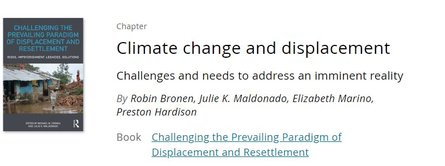
The climate crisis is causing some territories to become unviable for maintaining livelihoods and settlements as the land disappears due to climate change-induced sea level rise, erosion, and/or melting permafrost. Yet, to date, no developed or developing country has institutionalized a governance framework, or enacted legislation, to set out whether, when, and how climate-induced relocation processes are to be carried out in a manner that would protect the human rights of those compelled by circumstances to relocate themselves or to be relocated (Bronen 2015). The urgency to act which climate change does and should engender – and the large numbers of people threatened by displacement as ecological conditions change, making life in place impossible for some communities – calls for distinct strategies for handling these relocations. If no governance framework is specifically designed to address climate-forced displacement, it is highly likely that the unjust relocation policies that have been seen over the past decades in other types of displacement and resettlement will be replicated.
